
SUGAR & SPLICE, or Daughters Need Affection!
john cribbs
Splice is only the second movie I've gotten a chance to see in the theater this year (after Iron Man 2) on account of the fact that I'm a recent father and can't make it out as often as I used to. I know I complained about that in the 'smoke's epic Summer Movie Review, but it's more relevant here so excuse me for bringing it up again. You see, one of the restrictions of having an infant at home is you have to make arrangements for her if you want to go out to the movies, since I'm not a believer in taking human beings who can't even walk yet to a public theater, even for a 1:00 screening on a Thursday when there's likely to only be one or two other folks showing up for a movie that's already been out three weeks. You gotta find a sitter or a family member or make a deal with your awesome wife to keep tabs on the kid while you go out for two hours and enjoy a cherry Coke and cup of cinnamon pretzel bites as images are projected onto the screen in front of you (it all seems so foreign after a couple weeks of fatherhood). It's a hassle but it comes with the job, and it turns out it could be worse: I could have to worry whether or not my baby is going to skewer unsuspecting folks with her tail stinger while I'm out, or sprout wings and fly off to god-knows-where, or be subjected to non-consensual surgery by her mother. Those kind of concerns would make it even more difficult to take a break from parenting; if raising a child is a 24/7 gig, caring for a "Dren" like the overwhelmed couple of this film would be like working double shifts without overtime pay. Everything you ever dreaded would go wrong thanks to your bad parenting is represented in Splice, which turned out to be as perfect a movie to see the weekend of Father's Day as imperfect a movie Iron Man 2 was to see on any given day of the year.
The plot's familiar: hotshot genetic engineers/lovers Clive and Elsa - cute - who grow wiggly blobs from which they extract cattle protein for a pharmaceutical company (what is going on in Canada??) cross the legal and ethical line by splicing animal hybrid DNA with human samples to see what happens. Everything works out great, and there are no ramifications whatsoever. Ok, we all know that's not true - there's chaos and confusion and eventually violence. Turns out man was not meant to forge into the godless territory of blah blah blah. Cowriter-director Vincenzo Natali apparently worked for ten years on the script, and his hard work is most apparent in the movie's thoughtful and detailed theme of being a parent who is in way over your head. There are warnings about taking the advances of science too far, but what I took from the film that may or may not be influenced by my recent experience is that bad parenting can be as disastrous as growing a new species from the DNA of an "anonymous donor."
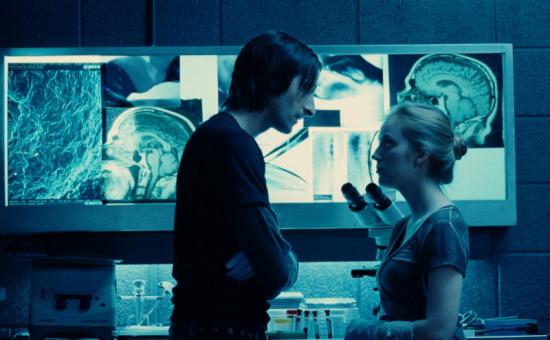 The first shot of the movie shows Clive and Elsa from the point-of-view of one of their newly hatched blob creatures, beaming proudly after a stillborn scare, a parody of elated parents at the transcendent moment of birth. On the surface it's their quest for groundbreaking biological results that prompt them to try and add a little human into their next experiment, but it comes off like a young couple who've just visited the adorable infant daughter of their friends, come home and had that "Maybe it's time?" talk. Although the authority figure from the company (the grandmother surrogate) disapproves, they make the decision on their own to create life together. They try several times, some kind of cell-monitoring instrument standing in for a pregnancy test, and each unsuccessful attempt gets them more discouraged until - just play a little jazz, lighten the mood - their professional tryst results in the first stage of life. After all that effort Clive just wants to call it a night and go to sleep, but Elsa, like Eve in the Garden, insists that there's no harm and playfully sets up the fused molecules to impregnate a host. Clive, his face a map of terror and uncertainty, holds his finger over the button that will effectively terminate the process before it's begun (let's not get into a debate here, pro-lifers!) and ultimately, against his better judgment, allows the fertilization to take place.
The first shot of the movie shows Clive and Elsa from the point-of-view of one of their newly hatched blob creatures, beaming proudly after a stillborn scare, a parody of elated parents at the transcendent moment of birth. On the surface it's their quest for groundbreaking biological results that prompt them to try and add a little human into their next experiment, but it comes off like a young couple who've just visited the adorable infant daughter of their friends, come home and had that "Maybe it's time?" talk. Although the authority figure from the company (the grandmother surrogate) disapproves, they make the decision on their own to create life together. They try several times, some kind of cell-monitoring instrument standing in for a pregnancy test, and each unsuccessful attempt gets them more discouraged until - just play a little jazz, lighten the mood - their professional tryst results in the first stage of life. After all that effort Clive just wants to call it a night and go to sleep, but Elsa, like Eve in the Garden, insists that there's no harm and playfully sets up the fused molecules to impregnate a host. Clive, his face a map of terror and uncertainty, holds his finger over the button that will effectively terminate the process before it's begun (let's not get into a debate here, pro-lifers!) and ultimately, against his better judgment, allows the fertilization to take place.
I don't know how it works in Canada, but here in the U.S. I'd say it's safe to assume that a majority of pregnancies are not the result of responsible thinking and careful planning. For every intelligent couple who establishes themselves in their career and environment well before making the informed decision to bring a new life into the world, there are five couples who didn't really think it through. They got wrapped up in the excitement, or just figured they'd play it by ear, or didn't want to lose the opportunity before it was too late. At the start of the movie Clive and Elsa are career-minded almost to the point of sterilization in their personal life. Even though their shared apartment is littered with the same kind of tech nerd junk I see all the time in my tech nerd friends' domiciles (anime, computer manuals), their small talk is about mucus and enzymes. Although they discuss their future and the possibility of having a kid, it's clear that there's hesitation on both sides. Their reasonable, pragmatic minds can't commit to the kind of unpredictable disorder having a child would bring to their lives, but there's clearly something missing.
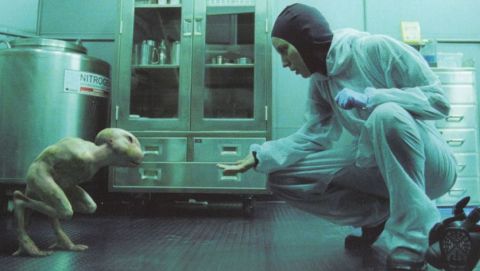 It's exactly that mentality that indirectly leads to the creation of Dren, a three-fingered, chicken-legged, cleft-headed (some would say butt-headed), big-eyed humanoid that exits its slimy cocoon bouncing off the walls like a monkey. Once again, Clive's initial response is to kill the thing before it's too late, but Elsa develops an instant maternal bond with the creature and decides to keep it. She dives into the parental role head on, adopting the playing-with-dolls attitude of the excited yet ignorant young mother who prefers the quick and easy child-rearing route rather than the correct one. She innocently spoils the baby, who won't eat the nutritious slop they give her until Elsa pours candy into the mix. Her ignorance is based in part on her professional detachment and view of Dren's development as a scientific curiosity rather than a delicate maturity that requires careful nourishment and emotional attachment, but mainly she just lets herself get caught up in the wonders and excitement of being a mommy. In the meantime, Clive plays the part of reluctant father, he can't stand the child's high-pitched screech and responses with revulsion at being vomited on. His relationship with infant-Dren resembles Jack Nance's to his mutant baby in David Lynch's Eraserhead: an exaggerated, metaphorical representation of the confusion that comes with being a new dad and repulsion at the base mannerisms of a baby experienced by someone unfamiliar with infant behavior.
It's exactly that mentality that indirectly leads to the creation of Dren, a three-fingered, chicken-legged, cleft-headed (some would say butt-headed), big-eyed humanoid that exits its slimy cocoon bouncing off the walls like a monkey. Once again, Clive's initial response is to kill the thing before it's too late, but Elsa develops an instant maternal bond with the creature and decides to keep it. She dives into the parental role head on, adopting the playing-with-dolls attitude of the excited yet ignorant young mother who prefers the quick and easy child-rearing route rather than the correct one. She innocently spoils the baby, who won't eat the nutritious slop they give her until Elsa pours candy into the mix. Her ignorance is based in part on her professional detachment and view of Dren's development as a scientific curiosity rather than a delicate maturity that requires careful nourishment and emotional attachment, but mainly she just lets herself get caught up in the wonders and excitement of being a mommy. In the meantime, Clive plays the part of reluctant father, he can't stand the child's high-pitched screech and responses with revulsion at being vomited on. His relationship with infant-Dren resembles Jack Nance's to his mutant baby in David Lynch's Eraserhead: an exaggerated, metaphorical representation of the confusion that comes with being a new dad and repulsion at the base mannerisms of a baby experienced by someone unfamiliar with infant behavior.
These contrasting roles come to a head in what's probably the best scene in the movie. Dren (now a toddler) is feverish and having difficulty breathing; impulsively, Clive grabs the child and holds her underwater as Elsa helplessly begs him to stop. For a minute it looks like Dren has drowned, then suddenly her eyes open and she breathes normally. Elsa concludes that Clive realized the child is amphibious and can breathe underwater. "You knew that, right?" Elsa questions worriedly, and receives no answer. After this incident things become deceptively easier for a while: Elsa puts Dren in pretty dresses and buys her stuffed animals while encouraging her education. Since Dren's life-cycle is sped up so that years are encapsulated in mere weeks, the filmmakers can follow her development, as well as Clive and Elsa's reaction to her changes, from birth to the rebellious teenage years. Unable to keep her secretly in the lab, her surrogate parents move her to the farm where Elsa grew up. There they make their biggest mistake by shutting her up in the barn in the ultimate display of parental ignorance about what's right for their child: thinking of her protection, they only isolate and frustrate her. What they don't understand she doesn't need shielding, she needs affection.
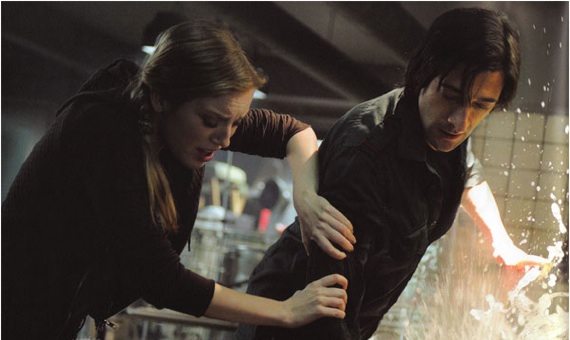 What I like is that the movie doesn't go the route of the 'noble parents' defending their mutant kid against a cruel world that doesn't understand its existence; like the original Dr. Frankenstein these two are terrible providers who make bad decisions that end in their "family" being torn apart. Every parental choice they make is based on what's best for their "daughter," but only lead to her resentment and misbehavior. Shortly after arriving on the farm, she runs off and they discover her hunched over gnawing on the remains of a disemboweled rabbit. They don't respond to this or reprimand Dren - it could be that the first time a child transgresses it's looked upon as cute, but really they just don't know how to deal with it. Dren's activities as she grows older are more extreme versions of what petrifies parents about their children. The way Dren forgoes learning to read and write and simply spells out words she couldn't possibly know is a condensed example of how fast kids grow up and, more importantly, how quickly they begin to self-educate and rely less and less on those who raised them.
What I like is that the movie doesn't go the route of the 'noble parents' defending their mutant kid against a cruel world that doesn't understand its existence; like the original Dr. Frankenstein these two are terrible providers who make bad decisions that end in their "family" being torn apart. Every parental choice they make is based on what's best for their "daughter," but only lead to her resentment and misbehavior. Shortly after arriving on the farm, she runs off and they discover her hunched over gnawing on the remains of a disemboweled rabbit. They don't respond to this or reprimand Dren - it could be that the first time a child transgresses it's looked upon as cute, but really they just don't know how to deal with it. Dren's activities as she grows older are more extreme versions of what petrifies parents about their children. The way Dren forgoes learning to read and write and simply spells out words she couldn't possibly know is a condensed example of how fast kids grow up and, more importantly, how quickly they begin to self-educate and rely less and less on those who raised them.
The ideal of what Clive and Elsa's "experiment" could become has at this point been completely shadowed by the reality of the situation, one they erroneously believed they had some kind of control over. As Dren follows the classic adolescent hatred of her mother and adoration of her father, so do the roles reverse for Clive and Elsa. Their relationship is like the male and female slug creatures they create (also cutely-named after a classic screen couple, Fred and Ginger), which come together in a harmonious form of love-making at the beginning of the film but end up tearing each other to pieces in an explosive act of violence in the movie's most effective moment of horror, the good ol' public humiliation scene that ends with investors in the front row drenched in blob blood. "No more monsters!" the head of the company amusingly instructs, and since their impatient employers are like nagging grandparents, social workers, or...impatient employers (like those of a recent Jeopardy! contestant who lost his job because he wanted to bring his dog to work), the subtextual suggestion that these two don't quite have what it takes to be responsible patients is implicit.
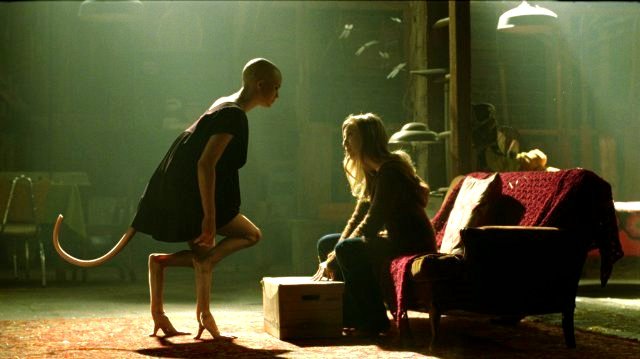 As Dren's reliance (symbolized by a very unsubtle scene of her spreading newly-grown wings to fly away from home but stopping when Clive and Elsa communicate their love) and worship of her parents begins to wane in favor of her own search for identity and independence, so does Elsa's love for her Splice Girl turn to indignation. When it turns out that Elsa used her own DNA in the experiment, technically making Dren her daughter, Clive implies that her own family doesn't have the best "motherly" genes. In a twist of anatomical destiny, Elsa (as, it's suggested, her mother behaved towards her) begins to resent Dren's development into a young woman and see her as more of a sexual rival. Dren responds to Elsa's spiteful act of taking a pet cat away from her, masked as punishment, by killing the animal when Elsa gives it back in an attempt to establish her authority. Although it's violent, it's really just a common teenage act of rebellion - Elsa, however, decides to see it as open hostility and responds in kind. Just as the mom in a more common relationship would punish her daughter by taking away her possesions, Elsa straps Dren on a slab and systematically removes everything that might make her "human" (her locket and her dress, clinically removed via scissors.) This marks Elsa's abandonment of her role as parental figure under the pretense of reestablishing her role as objective scientist. At this point, any lingering facade of parenting is gone and the "experiment," as it were, has definitely failed.
As Dren's reliance (symbolized by a very unsubtle scene of her spreading newly-grown wings to fly away from home but stopping when Clive and Elsa communicate their love) and worship of her parents begins to wane in favor of her own search for identity and independence, so does Elsa's love for her Splice Girl turn to indignation. When it turns out that Elsa used her own DNA in the experiment, technically making Dren her daughter, Clive implies that her own family doesn't have the best "motherly" genes. In a twist of anatomical destiny, Elsa (as, it's suggested, her mother behaved towards her) begins to resent Dren's development into a young woman and see her as more of a sexual rival. Dren responds to Elsa's spiteful act of taking a pet cat away from her, masked as punishment, by killing the animal when Elsa gives it back in an attempt to establish her authority. Although it's violent, it's really just a common teenage act of rebellion - Elsa, however, decides to see it as open hostility and responds in kind. Just as the mom in a more common relationship would punish her daughter by taking away her possesions, Elsa straps Dren on a slab and systematically removes everything that might make her "human" (her locket and her dress, clinically removed via scissors.) This marks Elsa's abandonment of her role as parental figure under the pretense of reestablishing her role as objective scientist. At this point, any lingering facade of parenting is gone and the "experiment," as it were, has definitely failed.
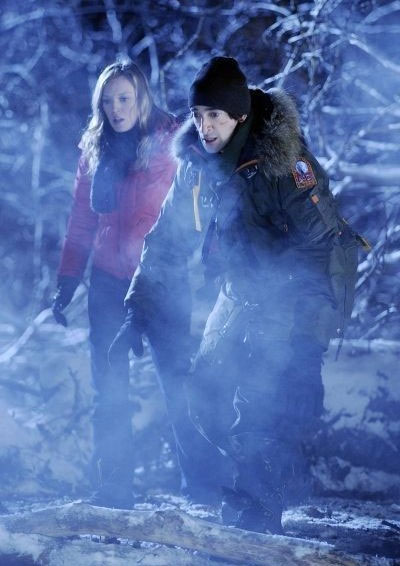 I'm tempted not to say a word against this movie. It hits a lot of the right notes with me as a sci fi-horror cautionary tale detailing the consequences of tampering with genetics and playing god in the Frankenstein/Dr Moreau mold. It's directed by the guy who made the highly entertaining Cube and stars the lovely and talented Sarah Polley, who hasn't headlined a major film in six years. The DNA molecules of the movie itself are stable, not surprisingly since it comes from good stock (a sprinkling of It's Alive, some skin flakes off the back of Cronenberg's The Fly.) I'd much rather see a movie like this enjoy a huge theatrical release than the all the sequels, remakes and adaptations of TV shows that plague the modern movie theater, but at the same time something tells me I'd like it more if it had come in under the radar, maybe playing a few festivals before debuting unceremoniously on DVD. Sort of the way I found Cube, ten years later after word-of-mouth had finally piqued my interest. The largely enthusiastic critical reaction it's received seems based on the movie's surface appeal and its supposedly crazy premise, which sounds like the sort of description given by people who don't normally watch horror movies. Then there are reviews that go overboard heralding it as a timely movie about the misuse of genetic technology - I guess, but if so it's not a particularly poignant one. Its relevance to the evolution of cloning and development of the self-replicating cell is superficial; besides, the project has been developing for over ten years.
I'm tempted not to say a word against this movie. It hits a lot of the right notes with me as a sci fi-horror cautionary tale detailing the consequences of tampering with genetics and playing god in the Frankenstein/Dr Moreau mold. It's directed by the guy who made the highly entertaining Cube and stars the lovely and talented Sarah Polley, who hasn't headlined a major film in six years. The DNA molecules of the movie itself are stable, not surprisingly since it comes from good stock (a sprinkling of It's Alive, some skin flakes off the back of Cronenberg's The Fly.) I'd much rather see a movie like this enjoy a huge theatrical release than the all the sequels, remakes and adaptations of TV shows that plague the modern movie theater, but at the same time something tells me I'd like it more if it had come in under the radar, maybe playing a few festivals before debuting unceremoniously on DVD. Sort of the way I found Cube, ten years later after word-of-mouth had finally piqued my interest. The largely enthusiastic critical reaction it's received seems based on the movie's surface appeal and its supposedly crazy premise, which sounds like the sort of description given by people who don't normally watch horror movies. Then there are reviews that go overboard heralding it as a timely movie about the misuse of genetic technology - I guess, but if so it's not a particularly poignant one. Its relevance to the evolution of cloning and development of the self-replicating cell is superficial; besides, the project has been developing for over ten years.
The more straight-up creature feature, Jeepers Creepers-like finale* has been almost universally derided, with good reason. The story reaches a scene where the movie could go one way or another, just like the moment in Species where Natasha Henstridge mates with Alfred Molina and succeeds in becoming pregnant. And as with Species, like an ignorant parent, Splice opts to go the quick and easy route by turning its sympathetic "monster" into an unstoppable killing machine. That's not to say this is the first wrong turn the movie takes; if it had more ideas leading up to the conclusion it would have thought of a better ending, and as a freaky horror film it kind of hits the wall and finds it can do nothing but resort to a chase movie in its final scenes (to be fair, so did The Fly). It wouldn't be quite as glaring if the movie hadn't been so restrained up to that point, relying on the audience's fascination with Dren's development to maintain tension and atmosphere. It seems like there are ways the ending could work: it could be about how you never really knew your kid in the first place, and they change when they grow up, or...no. No, it doesn't really work no matter which way you force it to fit with the rest of the film.
I've heard that the production's budget constraints are the reason for the sloppy climax, but for the most part I think they used their money wisely (it seems like the largest amount of it probably went to the mock-up issue of Wired with Adrien Brody and Sarah Polley on the cover.) Working for the film is the scaled-down cast, seven actors in all with only one scene involving any extras. If anything, they have too many. Cube star David Hewlett's character is a real unfortunate addition to the movie, a one-note company man who appears first as a corporate brown noser and later a petty supervisor jealous of his charges' fame. I appreciated the idea that a man with no talent is usually the one lashing the whip at the actual scientists and innovators, but his mere presence suggested that he was just around to be comically killed off later. Similiarly useless is Clive's brother Gavin played by Brandon McGibbon, whose main job is to stand around looking like Noah Taylor. These two undeveloped characters are basically just monster fodder; the minute they pulled up in a car together at the barn I thought 'Well - movie's over,' and I was right.
The leads make up for the uninspired supporting cast. I'm sure that Sarah Polley** has a lot to do with why people are so excited about the film. She's dynamite in the movie, and I'm actually offended that she didn't receive top billing, with Delphine Chaneac credited next and then Adrien Brody. Nothing against Brody, his performance is passable enough - he runs his usual range of emotions from fixating on something happening with his mouth open until things get too crazy, which causes him to rub his palm across his mouth then push his hair back. But they have great chemistry together, and considering neither is a parent in real life (that I know of) they do a great job conveying the terror of parenting, even if they are technically scared of a monster with supernatural powers who can kill them.
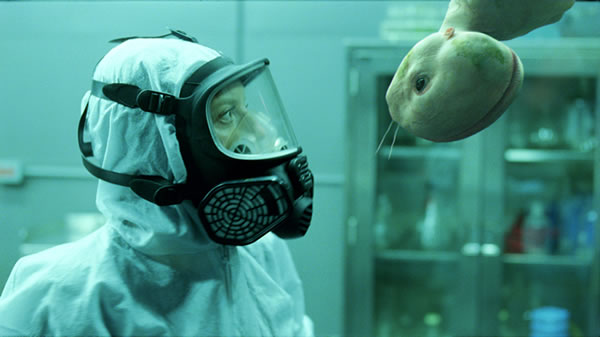
* Which includes a murder so casually committed it reminded me of when Homer Simpson-as-King-Kong gulped up Smithers in his sleep in "Treehouse of Horror III."
** In her Times review, Manohla Dargis refers to her "nontraditional beauty" - does she mean her Canadian accent?
home about contact us featured writings years in review film productions
All rights reserved The Pink Smoke © 2010